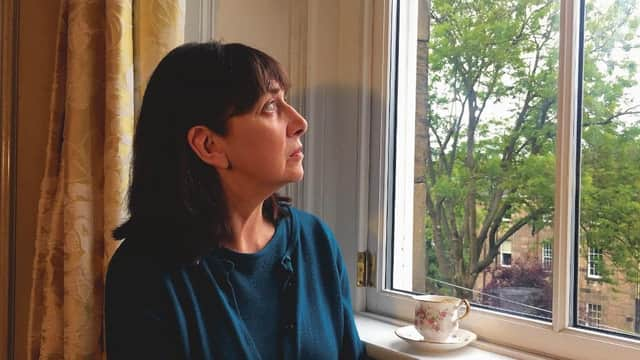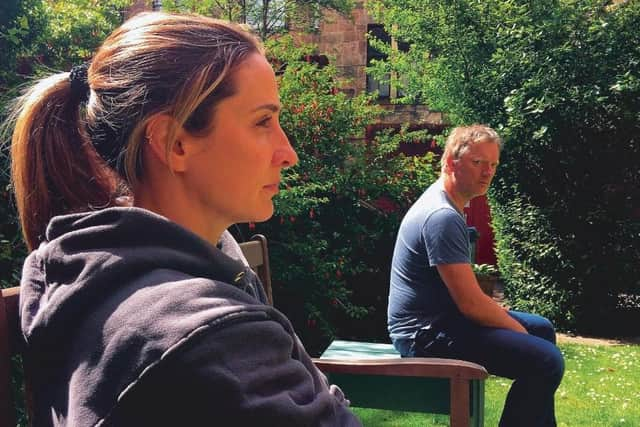Theatre reviews: Scenes for Survival | Stories to Connect Us | 2020 Stories


There are many ways of trying to recreate the thrill of “live” theatre online; some even involve real-time performances staged by a large company of online actors for a ticketed audience who are visible to each other and the performers, as they would be in a real theatre.
In commissioning its 50 Scenes For Survival from leading Scottish-based writers, actors and directors, though, the National Theatre Scotland has gone straight down the path to which most people in the performing arts immediately turned, when lockdown robbed them of the chance to meet their audiences face to face; the path of monologues and dialogues recorded in domestic settings. And what the NTS has achieved – with its co-producing partners Screen Scotland, BBC Arts In Quarantine and Hopscotch Films – is to raise the bar decisively in terms of the sheer artistry that can be brought to bear on that short-format screen form, investing tens of thousands of pounds in the artists involved, including film editors, musicians and sound designers, and already creating a body of work that fairly takes the breath away, in the range of themes and concerns it explores, and the depth of acting, writing and film-making talent on which it draws.
Advertisement
Hide AdSo in the films released during the past few weeks, we can see extracts from shows that have thrilled audiences in Scotland in the past, with pieces like Zinnie Harris’s When? (*****), based on a fragment from her 2000 play Further Than The Furthest Thing (about the people exiled from England from the island of Tristan Da Cunha), and performed with heartbreaking, mind-expanding intensity by Kathryn Howden as Tristan woman Mil, with Gilly Gilchrist as her kindly but helpless English employer. We can also catch glimpses of future NTS shows postponed because of the crisis; one of the most powerful and timely, at this moment, is the four-minute film Joseph Knight (****), a fragment from Edinburgh writer May Sumbwanyambe’s forthcoming play Enough Of Him, about the life of a black slave who fought a legal battle for his freedom in 18th century Scotland, performed with immense feeling by Patrick Martins as Joseph, and Emma King as his love Annie, as they lie on patches of grass 300 miles apart, in London and Dublin.


And then there are brand new pieces, written in and shaped by lockdown. Some of them – like Michael John O’Neill’s Sore Afraid (****), a terrific, left-field monologue for a grieving mother, directed by Dominic Hill and magnificently performed by Maureen Beattie – are subtly shaped by the confinements of lockdown; the same is true of David Greig’s Bees (****), a play about memory and reality wonderfully conjured up in a Glasgow garden by Lorraine McIntosh of Deacon Blue, and rounded off by a song from her husband Ricky Ross. Others, though, deal with lockdown tensions and horrors more directly, from Greg Hemphill’s The Banshee (****) performed by Julie Wilson Nimmo, about a bullied wife under lockdown receiving a dire warning of the slow emotional death she is suffering, to the fierce marital comedy of Wednesday (****) by Tena Stivicic, written for her husband, Shetland star Douglas Henshall, with acclaimed actress Morven Christie, and directed by Finn den Hertog on a Glasgow back green for an admiring audience of Weegie tenement-dwellers, hanging out of their windows to watch and applaud.
And most topically of all, there is Shetland co-star Mark Bonnar’s outstanding performance in Rob Drummond’s Larchview (*****), as a government scientific advisor forced to resign after breaching lockdown rules. At home alone with his smartphone, he makes repeated attempts to record his short resignation speech and apology, with more of the messy truth emerging at every attempt. Drummond’s writing is superb; and Bonnar’s face, throughout, is like a moving embodiment of all the strain, strangeness and grief of lockdown, providing – like this batch of Scenes For Survival as a whole – an unforgettable image of this strange time, imprinted on our memories forever.
Larchview is directed by Jack Nurse, one of the rising stars among young Scottish directors; and a completely different aspect of Nurse’s talent is also available to view this week, as his young Glasgow-based company Wonder Fools launch a new online season based partly on successful past work, and partly on new writing. The company’s Stories To Connect Us season kicked off on Tuesday with the release of an online recording of Wonder Fools’ fiercely impressive 2018 touring show The 549: Scots Of The Spanish Civil War (****), filmed live in a community hall in Kirkmichael, Ayrshire. Written by Wonder Fools co-founder Robbie Gordon, the play emerged, in Nurse’s production, as a formidable piece of popular small-scale touring theatre in the 7:84 tradition, educating working class audiences across Scotland about their own history, while providing a superb night out; and it will be followed, over the next few weeks, by a revival of Wonder Fools’ successful 2017 interactive show The Coolidge Effect and three new plays.
And finally, if you’re seeking reassurance that the future of dramatic writing in Scotland is in good hands, you could do much worse than tune in to Scottish Youth Theatre’s tremendous evening of mini-shorts, 2020 Stories: The View From Here (****). It features 20 stories written by 20 young SYT writers, and performed by 20 of Scotland’s leading actors, including Brian Ferguson, Elaine C Smith, Alan Cumming, Bill Paterson, and Johnny McKnight, among many others. Subjects range from the sheer psychological strangeness of lockdown – perfectly captured in Violet Ptolomey’s opening monologue My Life Is A Snowglobe, performed by Leah Byrne – to Bill Paterson’s beautifully understated evocation of the pure emotion of an elderly doctor, returned to work during the pandemic, and writing a love letter to the wife he has not seen for weeks; and the programme as a whole is a tribute not only to the talent of the writers involved, but also to the almost magical power of great actors, in making those words leap from the page, to touch our hearts.
The National Theatre of Scotland’s Scenes for Survival are available at www.nationaltheatrescotland.com/events/scenes-for-survival; Wonder Fools at www.wonderfools.org/storiestoconnectus, and the Scottish Youth Theatre’s 2020 Stories at www.youtube.com/watch?v=KbIV9nsk_8Q. All free of charge, with donations requested
A message from the Editor:
Advertisement
Hide AdThank you for reading this story on our website. While I have your attention, I also have an important request to make of you.
With the coronavirus lockdown having a major impact on many of our advertisers - and consequently the revenue we receive - we are more reliant than ever on you taking out a digital subscription.
Advertisement
Hide AdSubscribe to scotsman.com and enjoy unlimited access to Scottish news and information online and on our app. With a digital subscription, you can read more than 5 articles, see fewer ads, enjoy faster load times, and get access to exclusive newsletters and content. Visit https://www.scotsman.com/subscriptions now to sign up.
Joy Yates
Editorial Director